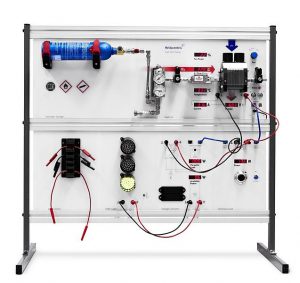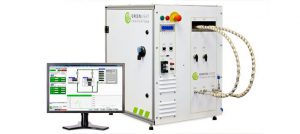1.1. Clean Energy Trainers
A total of ten “Clean Energy Trainers” in Clean Energy Lab examine renewable energy generation through solar and wind and introduce students to the methodology of efficient energy conversion, storage and supply by means of hydrogen fuel cell technology. Students gain a sound understanding of the complete energy conversion chain, the practical application and principles behind the technologies.

Sample Experiments
• Operation and principles of solar cells and wind generators.
• Influence of illumination intensity and cell shading on the behavior of solar cells.
• Temperature dependence of photovoltaic modules.
• Connecting solar panels in parallel and series Electrolysis: characteristic curve and efficiency.
• Fuel Cell: correlation between hydrogen consumption and current
• Power-to-Gas: hydrogen from renewable energy
• Introduction to Micro-grids and Hybrid Energy Systems
• The cause and effect of energy inputs and energy usage (loads)
• Dimensioning of a hybrid energy system
• Introduction to Topics of Energy Management and System Management
• Load and Weather Simulations.
1.2. Dr. Fuel Cell® Professional
Dr. Fuel Cell® Professional provides students in the hands-on teaching of solar hydrogen technology. Various modules reproduce a complete energy cycle. Technologies such as solar and fuel cell technology, can therefore be examined in detail and portrayed within the context of the overall concept. The Renewable Energy Laboratory at USPCAS-E is equipped with ten such training units.


Sample Experiments
• Current/voltage characteristic curves of
solar panel and fuel cell
• Demonstration of Faraday's first law Electrolysis
• Faraday and energy efficiency of an electrolyzer of a fuel cell
• Demonstration of electrochemical processes
• Series and parallel connection of
fuel cell
• Determination of Avogadro’s Constant, via Electrolysis effect.
• Solar Cells (Light Source, Shadow Effects, Angle, Efficiency)
• Parallel and Series Circuits
• Energy Storage and Conversion, and Creation of a Characteristic Curve.
1.3. Solar Hydrogen Extension
The Solar Hydrogen Extension generates hydrogen from solar power. It is a complete off-grid photovoltaic system combined with an electrolyzer. A software program helps students to learn about energy flux and system efficiency. The hydrogen is stored in metal hydride canisters which are also used in training and fuel cell systems. Mobile solar modules with adjustable angle of inclination and various solar sensors allow for in depth experiments on solar power generation.


Sample Experiments
• Optimal alignment of solar modules for maximum generation of hydrogen.
• Determining the efficiency of the electrolyzer.
• Basics of solar photovoltaic power generation
• Functional principle of an off-grid solar system
• Efficiency analysis of solar hydrogen production
• Dimensioning of a solar hydrogen system.
1.4. Fuel Cell Trainers
The two 50W Fuel Cell Trainers in the lab are used for teaching fundamental engineering principles of fuel cell systems. Extensive hands-on experimental capabilities and optimized experiment guide make them comprehensive training systems for students. The modular character of the Fuel Cell Trainers allows students to examine each component individually to understand complete fuel cell systems.

Sample Experiments
• Basic functions of a fuel cell system
• Characteristic curve of a fuel cell and its influencing factors
• Determination of the hydrogen-current curve
• Efficiency of the fuel cell stack
1.5. Nexa® Training System
The Nexa® training system is used for teaching engineering principles in the design of energy systems with fuel cell technology based on industrial systems components.

Sample Experiments
• Quick designing an optimized fuel cell energy system for the supply of a specific load.
• The trainer is equipped with 1.2KW fuel cell module. The Renewable Energy Lab is equipped with two such trainers.
Researchers can use the system to examine detailed system performance of various set-ups such as;
• Hybrid Electric Vehicle Power Supply
• Uninterruptable Power Supply (UPS)
• Autonomous Power Supply
• Portable Power Supply
1.6. Fuel Cell Testing Station
Green Light Innovation FCTS-G20. The G20 FCTS has expanded capability in low power fuel cell characterization. This station has been designed for small active area, single cell R&D testing with optional configuration for high temperature PEM research.

Sample Experiments
• Determining the operating parameters, such as air stoichiometric ratio and Fuel composition of a fuel cell
• Influence on the PEM fuel cell behavior under both steady-state and transient conditions.
1.7. EDIBON Computer controlled Wind Energy Unit with SCADA and Grid Connection Inverter Kit
Wind energy is a renewable source of energy that occurs in the nature spontaneously and can be harnessed to meet the necessity of power. It is being used from a very early age and the technology of using this energy efficiently is being improved with time.
The Computer Controlled Wind Energy Unit, “EEEC”, contains an aero-generator, in laboratory-scale, and is used to study the conversion of kinetic wind energy into electrical energy and to study the influence of some factors on this generation.


